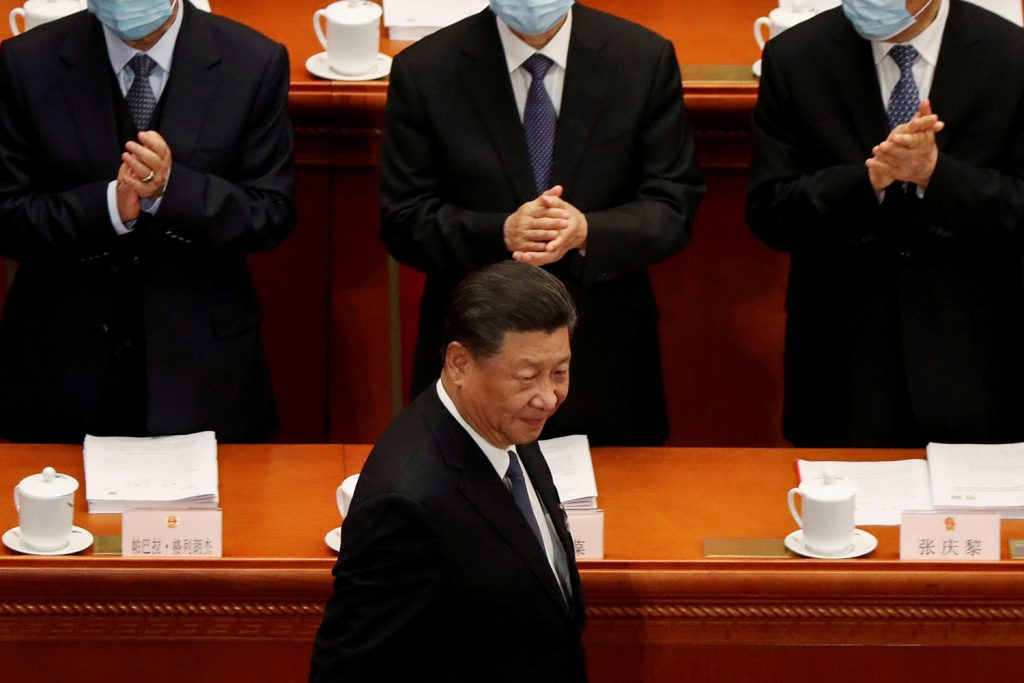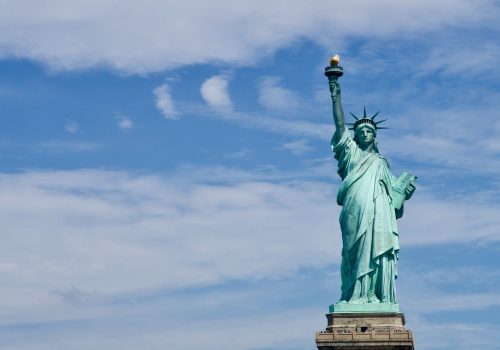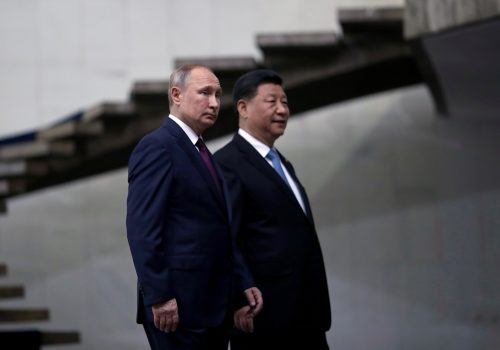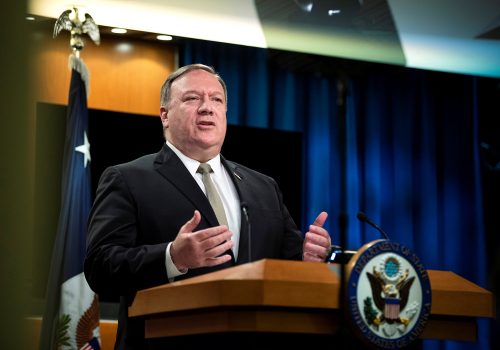The key takeaway: The White House’s lead coronavirus-response coordinator has criticized Chinese officials for a “delay in information” on the outbreak of the virus in January, which she argued hampered the ability of other countries to respond effectively to the pandemic. Speaking at an Atlantic Council event on July 7, Ambassador Deborah Birx said that “if we had known about the level of asymptomatic spread, I think we would have all looked at this differently.”
The event, which featured diplomats from Europe, North America, and the Asia-Pacific as part of the launch of a new Atlantic Council report on strategies for shaping the post-COVID-19 world, covered a lot of ground. Here’s a spin through some of the highlights.
China’s delay caused confused responses
- Birx explained that many public-health officials in Europe and the United States were caught off guard by the “unusual spectrum of the disease,” which could vary from completely asymptomatic cases to moderate cases and fatal ones. Knowing the levels of asymptomatic cases, which Birx said were initially estimated to be 15 percent of cases but now are thought to be as high as 40 percent, would have been especially helpful in crafting responses, she noted: “If countries had known that from the beginning there would have been a very different response to this.”
- Birx added that it is “usually the initial country’s responsibility to get information [out] on the spectrum of the disease,” but China did not do this quickly enough. Birx maintained that China’s hesitance to share its findings delayed “across the board our ability to see or look for” asymptomatic cases in the initial response.
- Frustration at China’s early response to the pandemic led Australia to ask the World Health Organization (WHO) to launch an investigation, but Australian Ambassador to the United States Arthur Sinodinos cautioned that this “should not be seen as just a cross examination of China,” but rather as a crucial step in figuring out “how we could do things better in the future.”
International cooperation “saved a lot of people”
- Birx’s references to China’s record on international transparency and collaboration contrasted with her comments on the record of US allies in Europe and Asia. While they “were confronting this virus, they would drop everything to give me the specifics of what they were seeing,” she noted. Addressing the assembled diplomats, Birx asserted that they “saved a lot of people in the United States when you shared that information early on.”
US waves goodbye to the WHO
- Birx’s praise of international cooperation occurred just as the Trump administration gave formal notification of its intention to withdraw from the World Health Organization over allegations that the institution has been ineffective and too vulnerable to Chinese manipulation. Birx maintained that the United States has “always invested in global health…not only investing dollars but also Americans on the ground,” in the fight against diseases such as HIV, tuberculosis, and malaria.
- Ricklef Beutin, deputy chief of mission at the German embassy in the United States, conceded that criticism of the WHO “is welcome” as the world begins to learn from its experience with the coronavirus, but added that “it is not a good idea to hamper the organization while in the full thrust and brunt of this pandemic.”
- Sinodinos downplayed the potential effect of a US withdrawal, which would not happen until July 2021, as he doesn’t believe that there will be too large of a funding gap should Washington exit the organization. “The United States will [still] cooperate with the work globally and I think that will be fine,” he said.
A new platform for international cooperation?
- The July 7 Atlantic Council event was the first public iteration of the D-10 Strategy Forum, an annual meeting of representatives from the largest democracies around the world to help strengthen cooperation, organized by the Scowcroft Center for Strategy and Security’s Democratic Order Initiative. The D-10 format, which includes the Group of Seven (G-7) countries plus South Korea, Australia, and the European Union (with participation from India, Poland, Indonesia, and Spain), has been floated as a formalized complement for the G-7 group to help boost collaboration among democracies.
- Martin Loken, minister for political affairs at the Canadian embassy in Washington, said that the D-10 exercise and other fora for cooperation can “help us ultimately build a stronger, more effective rules-based system to deal with the next pandemic and the other challenges that are no doubt coming our way.”
US needs more discipline for social distancing
- As the United States has seen confirmed coronavirus cases rise across dozens of states over the last few weeks, Birx conceded that the United States has struggled to maintain the same rigid social-distancing measures that have been successful in Europe and Asia. “We are very excited about the discipline that many of the citizens of other countries have brought to this response and I think we are working on that same level of discipline.”
- Birx said the growth of cases among eighteen to thirty-five-year-olds in recent days has surprised public-health officials. “This was an age group that was so good and so disciplined through March and April. But when they saw people out and about on social media, they all went out and about,” she observed.
- Adherence and buy-in to social-distancing restrictions was critical to the effectiveness of efforts to combat COVID in Europe, Italian Ambassador to the United States Armando Varricchio said. “The very reason why we have been able to start reopening the country as of early June is precisely because we have been very careful in enforcing tight measures since the very first days,” he noted.
- EU Ambassador to the United States Stavros Lambrinidis agreed, saying that Europe’s relative success at bending the curve of infections stemmed from the fact that “there was a very clear sense that this was a crisis that every individual had a role to play to contain.”
Pump the brakes on reopening
- South Korea’s deputy chief of mission in Washington, Moon Seoung-hyun, added that government officials should be cautious before beginning to reopen their societies in an effort to restart economic growth. “Ultimately there are no benefits to reopening the economy if you do not have the virus under control,” he said, as “people stay home whether the government allows them to go out or not.” South Koreans are returning to normal life only because “the public has remained confident that the government has control of the virus,” he explained.
- Japan’s deputy chief of mission to the United States, Kazutosghi Aikawa, further warned against speedy reopenings, as he noted that after Japan’s own lifting of restrictions “last week and this week the number seem to be ticking up. That is not what we would like to see.”
The fight against “vaccine nationalism”
- While cases continue to rise in the United States, Birx noted that officials have seen “a really dramatic decline in our case fatality rates,” which she credited to the scientific cooperation between Europe and the United States, work the United Kingdom has done on steroids, and US trials of the drug remdesivir.
- Brix reported that US officials are working with their European partners, especially the United Kingdom, on developing a future vaccine.
- Michael Tatham, the deputy chief of mission at the British Embassy in Washington, acknowledged the concern that the development of a vaccine could prompt an international scramble for supplies, but explained that there “are a number of initiatives and funding mechanisms that are specifically designed to counter the risk of vaccine nationalism,” which he said is “a very positive sign of the level of international commitment and will” to avoid a damaging fight in the future.
David A. Wemer is associate director, editorial at the Atlantic Council. Follow him on Twitter @DavidAWemer.
Further reading:
Image: Chinese President Xi Jinping walks past officials wearing face masks following the coronavirus disease (COVID-19) outbreak as he arrives for the opening session of the National People's Congress (NPC) at the Great Hall of the People in Beijing, China May 22, 2020. REUTERS/Carlos Garcia Rawlins



